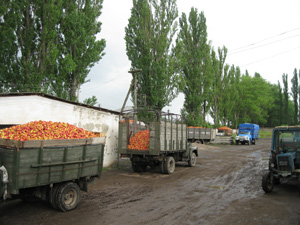Shorena Latatia

June 20 was the International Day of Refugees. The day has been celebrated throughout the world and in Georgia too for 9 years already. “Real People – Real Needs” – it was slogan of the charity events organized by the UNHCR and Ministry of Refugees and Accommodation of Georgia. However, the slogan was not enough and real needs require real sources to be resolved.
According to the UN, there are 43, 3 million IDPs, refugees and asylum-seekers throughout the world.
First refugees appeared in Georgia in 1994. However, their number before 1999 was too small. In 1999, because of Russian-Chechen war, about 7 000 citizens of Chechnya arrived in Georgia and sought refugee status here. The government of Georgia granted them with the status and settled them in the Pankisi Gorge together with their relative ethnos Kists. However, after the war finished part of them returned to Chechnya within the framework of voluntary repatriation; another part migrated to Western Europe and North America where they received shelter.
As for IDPs, according to official statistics there are more than 251 000 IDPs from Abkhazia (1992-1993) and Tskhinvali region (1989-1992). As a result of the armed conflict in 2008, 26 000 people were internally displaced from Tskhinvali region.
On June 20, the Human Rights Center visited several villages in Shida Kartli region (Karaleti, Tkviavi, Karbi, Koshka, Mereti and Gugutiantkari). IDPs and local people both have common problems.
As a result of the conflict of 2008, the state compensated the victimized families in the conflict zone with 15 000 USD. Hamlet Petuashvili from Karaleti said the compensation was not enough even to roof the house. Nobody managed to restore the damaged house in the village and they still live in single rooms which were constructed for them with the EU funds.
“It is very difficult to see my destroyed house every day. I always remember the day when they set my house on fire and burnt down in front of me,” said Tsisana Kasanashvili from Tkviavi.
Lamara Tedliashvili from Karaleti complained that everybody forget them after the war. The food program was also dropped in December of 2009. They received food during 8 months within the UN Food Program and the organization does not know whether they will continue the program or not.
Before the armed conflict in August of 2008, the only source of income for locals was agriculture. Because of hard social conditions part of people could not cultivate the land. Unfortunately, those people, who spent their last money on the fruit-gardens, are not in better situation either. Before the war they could sell a box of apple for 15-30 GEL now it costs 4 GEL.
“Before Ergneti market was closed, we sold apple and other fruits there. The price was acceptable for everybody – 15-30 GEL. I could sell apple even after the market was closed with the support of my personal contacts. This year, the only source to sell our apple are factories where we used to deliver the worst apple before the war,” said Zurab Zaalishvili from Karaleti.
Employee of the factory in Karbi village Dato Khokhobashvili clarified that they produce concentrate from the apple they purchase from locals and the concentrate is sold abroad in Germany. He said the factory can produce 10 tons of apples a day. The villagers have much more apples. Consequently, people have to stand in queues to sell their fruit.
“Although the price they pay for our product in the factory is ridiculous and cannot even cover the expenses we have made on our gardens, there is no way out. Where shall we take so many apples? We have to sell our products at a low price. We tried to sell the apple in Gori or in Tbilisi several times but nobody bought it there. The earned money was not enough even for the transportation,” said Luba Beruashvili from the village of Gugutiantkari.
One more important problem is security in the village. Residents of Gugutiantkari said they hear gun-fire almost every day from the occupied territory; so they are afraid even to enter their gardens which are located on the territories controlled by the Georgian side.
Thus, real problems and threats are really lot. The point is who and how are the problems going to be resolved.
News
December 13, 2023
Ethnic minorities outside the peace dialogue
November 6, 2023
‘Peace’ agenda of political parties
Popular
Articles
February 13, 2024



